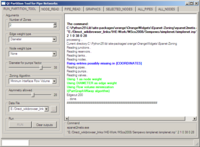Difference between revisions of "UNESCO-IHE Asset Management Tools"
| Line 15: | Line 15: | ||
==Tips on use== | ==Tips on use== | ||
[[image:WNZoning_interface.png|thumb| | [[image:WNZoning_interface.png|thumb|200px|Input page of the zoning tool]] | ||
* When installing the software follow the default suggestions made by the installer. | * When installing the software follow the default suggestions made by the installer. | ||
* | * Following are a list of parameters to be specified: | ||
*;Number of Zones: | |||
*;Edge weight type: The parameter to be used to provide weights to the edges. | |||
*;Node weight type: The parameter to be used to provide weights to the nodes. | |||
*;'Diameter for pumps factor': Epanet does not specify a diameter value for a link representing a pump. Specify the diameter to be used for pumps, as a multiplier of the average pipe diameter of the network (for the purpose of weights above). | |||
*;Zoning algorithm: In our experience Hmetis algorithms often provide better results. However, experiment. | |||
*; Asymmetry allowed: (Only for hmetis) The first priority of Hmetis is to provide contiguous zoning. However, this is always not possible to achieve while maintaining the required balance of zones (e.g. Demand in each zone or number of nodes in each zone.) This factor indicates by how much percentage this balance can be sacrificed. Always start with a small value. | |||
*;Data file: EPANET 2.0 network (<tt>.inp</tt>) file for input. | |||
Revision as of 13:32, 3 September 2008
During the year 2008, a number of modeling tools related to Asset Management of Networked Water Utilities were developed by a number of students who completed MSc Degrees at IHE. In order to make the use of these tools as painless as possible, we have adopted (with permission) the Orange data mining tool developed by the Artificial Intelligence Laboratory of Faculty of computer and information science, Ljubljana University to provide an integrated graphical user interface to the set of tools. We thank Janez Demsar, Blaz Zupan, Gregor Leban of Ai Lab for their cooperation in the interfacing phase.
Currently there are three integrated tools in the system.
- A tool for optimal zoning of water distribution networks
- A criticality analysis tool for asset management of utility networks
- A visual programming tool for implementing water safety plans for water supply schemes.
Download the software
Orange-snapshot-2008-04-24-py2.5.exe
optimal zoning of water distribution networks
- Reference
- J. Sempewo, A. Pathirana and K. Vairavamoorthy, Spatial analysis tool for development of leakage control zones from the analogy of distributed computing. sempewo_pathirana_vairavamoorthy_WDSA2008
How to use
Install the software. There will be a start menu shorcut called Start->Programs->Orange->UNESCO-IHE with several shortcuts. The shortcut WNZoning directs to the zoning tool. The input file must be in EPANET 2.0 network format (.inp format).
Tips on use
- When installing the software follow the default suggestions made by the installer.
- Following are a list of parameters to be specified:
- Number of Zones
- Edge weight type
- The parameter to be used to provide weights to the edges.
- Node weight type
- The parameter to be used to provide weights to the nodes.
- 'Diameter for pumps factor'
- Epanet does not specify a diameter value for a link representing a pump. Specify the diameter to be used for pumps, as a multiplier of the average pipe diameter of the network (for the purpose of weights above).
- Zoning algorithm
- In our experience Hmetis algorithms often provide better results. However, experiment.
- Asymmetry allowed
- (Only for hmetis) The first priority of Hmetis is to provide contiguous zoning. However, this is always not possible to achieve while maintaining the required balance of zones (e.g. Demand in each zone or number of nodes in each zone.) This factor indicates by how much percentage this balance can be sacrificed. Always start with a small value.
- Data file
- EPANET 2.0 network (.inp) file for input.
